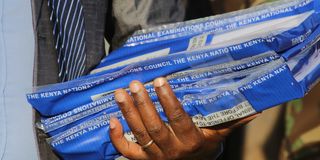Premium
Registration for July KCSE exams halted pending hearing of case

Government officials oversee the distribution of KCSE examination papers at Kiawara Police Station in Nyeri County on November 4, 2024.
The High Court in Kisii has suspended the registration of candidates for the Kenya Certificate of Secondary Education (KCSE) examinations for repeaters and private candidates slated for July.
This follows a petition filed against the Kenya National Examinations Council (Knec) by Dr Magare Gikenyi who argued that the decision to administer the exams violates students’ rights and was reached without proper public participation.
Justice Teresa Achieng Odera certified the case and scheduled a hearing for February 12.
The petitioner argues that the exams directive violates constitutional rights, including the right to education and fair administrative action. He further claims the decision was made arbitrarily without consulting key stakeholders, including parents and students.
The new policy, announced by Education Cabinet Secretary Julius Migos Ogamba on January 8, and formalised by Knec on January 22, requires repeaters and private candidates to register for the Kenya Certificate of Secondary Education (KCSE) July exams between January 27 and February 21.
Other candidates who are in school will sit their examinations in November as usual.
Dr Gikenyi contends that the exams unfairly disadvantage candidates by reducing their preparation time and creating two classes of candidates with different examination schedules.
He further argues that candidates will be denied their “legitimate expectation” to prepare and sit the exams traditionally held in November.
“The mandatory nature (as opposed to choosing either to sit for July or November examination series) goes against the right of every individual to choose the examination which is convenient to him or her so as to enjoy the rights and fundamental freedoms in the Bill of Rights to the greatest extent as provided in Article 20(2) of the Constitution,” the petition reads.
Knec Chief Executive Officer David Njeng’ere is listed as the second respondent in the suit. Others included are Mr Ogamba and the Attorney-General. The petitioner has listed the Kenya Secondary School Heads Association, Kenya Private Schools Association and Kenya Parents Association as interested parties.
“If this honourable court does not stop the illegal actions and or omissions done by the respondents, then the outlined constitutional violations will continue against the rule of law and principles of good governance,” Dr Gikenyi states in the petition.
He further notes that the shortened registration period disadvantages repeaters and private candidates who must self-fund their exams without government support.
“Impugned administrative action guidelines with short preparation period will impede one’s effort to achieve his or her economic and labour market potential ostensibly by scoring less than expected. This actions and/or omissions contravenes articles 10, 41, 43 and 73 of the Constitution,” he states.
“It’s an undeniable fact that the respondents will use the KCSE results to place students in various public and private universities. Once unfairly treated in secondary school, the learners’ future life is doomed.
"The constitution should never allow administrative decisions that affect rights of students or children, who are the future of this country. Students and parents have a lot of regard on the course to pursue. This will have devastating effects to the majority of Kenyan students affected by this barbaric administrative action,” he adds.
Dr Gikenyi argues that conflicting statements from the Ministry of Education and Knec—the CS stated that adult candidates “may” opt for the July series, but Knec guidelines mandate it—creates confusion and uncertainty.
The petition also highlights Kenya’s current economic struggles, arguing that the financial burden placed on repeat candidates and private candidates—many of whom are already struggling—exacerbates inequality in access to education.
“Currently, the Kenya’s economy is struggling and as a result, the same has caused a lot of financial strain and pushed taxation beyond majority of Kenyans.
"However, instead of respondents doing the right thing, they have further punished the Kenyan learners with this unconstitutional administrative decision,” he says.





